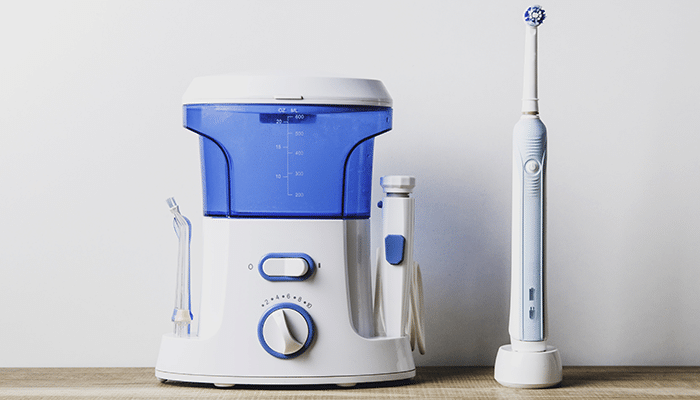Brushing keeps your teeth clean and healthy, but flossing is needed to reach the nooks and crannies that the toothbrush bristles just can’t hit. This brings up the question of a water pick being an alternative to flossing.
A water pick can help remove food particles from your teeth and might help reduce bleeding and gum disease but it isn’t generally considered a substitute flossing. It doesn’t generally remove visible film and plaque on your teeth, but can aid in the reduction of bacteria even below the gumline. Using a water pick can be a good choice for your individual needs depending on your specific situation. To find out what’s right for you, let’s break down what a water pick is and what it can be useful for.
What Is A Water Pick?
A Water Pick (otherwise known as a water jet or oral irrigator) is a dental device designed to eject a strong & compact stream of water to wash away loose food particles and bacteria. It is useful for reducing bleeding and cleaning hard-to-reach gum areas. As mentioned earlier, it is not as effective as flossing, this is because it cannot always quite reach the same spaces or same functionality as traditional flossing. Water Picks also tend to be more expensive than traditional dental floss.
Why Use A Water Pick?
The condition of your oral health can make a water pick more suitable and more comfortable for your needs. If you are willing to sacrifice some effectiveness for comfortability, a water pick is probably the choice for you. It is a better choice than not using any flossing tool at all.
Some reasons you may consider a water pick over traditional flossing:
- Have particularly sensitive gums
- Received non removable dental work such as dental implants or bridges
- Received crown placements on multiple teeth
- Easier movement for people with muscle-related issues such as arthritis or carpal tunnel in their hands/arms.
- You refuse to use traditional flossing methods for any other reason (maybe you just hate flossing the regular way)
Conclusion: Choosing What’s Best For You
Before making any major change in your dental hygiene routine, we suggest consulting with your dentist so they can help you with anything you are curious about. We highly recommend traditional flossing, but choosing a dental routine that you can stay consistent with is the number one priority to keeping yourself on track to a happy and healthy mouth.



